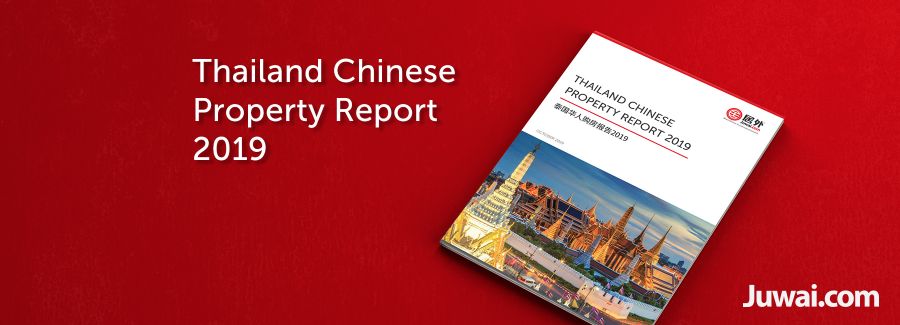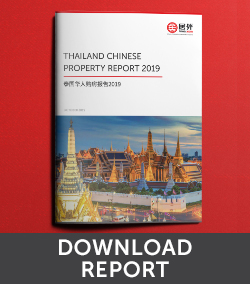Asia News
- Home
- News
- Asia News
You've successfully copied this link.
Juwai Property Report 2019: Thailand

Juwai.com’s country ranking, by number of buyers purchasing enquiries, puts Thailand ahead of Australia, Canada, Japan and the United States.
In fact, Thailand ranks number one on its Top 5 Chinese buyers’ most-favoured destinations.
According to CBRE, a leading international property consultant, China is playing a growing role in Thailand’s economy and property market.
Chinese nationals now comprise the second largest number of expatriates with work permits in Thailand, second only to Japanese expatriates. The number of Chinese work permit holders has grown by 185.25 per cent over the last eight years.1 Here are 6 reasons why Chinese flock to Thailand for real estate investments.
#1 Affordable prices
Price is a huge priority and a very important reason for Chinese buyer interest in Thai residential property. Worldwide, the medium property price for Chinese buyer inquiries was US$308,000 (approximately 9.5 million) in 2018. Thailand suits the price conscious Chinese buyer well, given that the average price of the unsold new property in Thailand is only about US$90,146.2
Even though, the baht has gained 9.9 per cent in value against the renminbi over the past 12 months, the stronger currency has been partially offset by cheaper property prices in Thailand. Asking prices for new condos in Bangkok have fallen six per cent year-on-year.3
Apart from that, in Thailand, foreigners are treated like Thais when it comes to taxes on property purchases whereas elsewhere (such as Canada and Australia), foreign buyers pay more in sales tax.
According to Juwai.com, Chinese buyers in the first quarter of 2019 made four times more property buying inquiries in Thailand compared to the same time the year before.
# 2 Educational opportunities
Education is another primary driver for Chinese investment, with Chinese children making up the fastest growing segment of cross-border student population.
Thailand’s education sector is positioning itself to become the hub in Southeast Asia for quality private education. Thai international schools offer lower fees than do similar schools in mainland China and yet still offer highly regarded American and European curriculum, facilities, and teaching staff.
International schools in Thailand also put less pressure on students. School curriculum is designed to give children a chance to explore their full range of interests, develop more wholesomely, and to become independent thinkers and problem solvers. This is different than the focus on cramming for high-stakes exams present in some Chinese schools.
There are now more than 200 English language international schools in Thailand, ranking the country third in Southeast Asia and ninth in the world. Thailand’s international schools host some 73,000 students, employ more than 8,000 instructors, and generate US$845 million in revenue per year. The largest centres for international schools are Bangkok and Chiang Mai.4
# 3 Proximity to China
The fact that major cities in China are as close as a two-hour flight is a benefit that helps draw buyers in all categories. Proximity is especially important to Chinese retirees and investors who often travel home to visit family. Families educating their young children in Thailand also often split their residency, so easy commuting to China is a great draw for Chinese buyers.
There are currently close to 1,300 weekly flights from Thailand to China. China now accounts for more than 25% of total international seat capacity from Thailand. There are nine airports in Thailand with services to China; three of these airports have at least 30 Chinese destinations.4
#4 Quality Health Care
Obtaining access to high quality and low-cost medical care is another Chinese buyer motivation. While many Chinese visit Thailand as medical tourists for brief stints of care, older Chinese find the easy availability of high-quality and affordable care in Thailand a desirable place to reside and to retire.
Despite the high standards of local medical care, it is cheap by international standards. For example, the Australian government estimates that medical procedures are as much as 40 per cent cheaper in Thailand than in Australia.5
#5 Better quality of life
The number of Chinese who may retire in Thailand in the coming years is expected to increase exponentially. By 2030, there will be 340 million Chinese aged 60 or above. That's more than five times the present population of Thailand. Most Chinese people begin planning and investing for retirement in their 40s and 50s and choosing a second home to retire in is high on their priority list when considering where to invest overseas.
Bangkok and Chiang Mai are the most popular cities for Chinese retirees, according to Juwai.com.6
Like this report sneak peek? Sign in now to download our Juwai Property Report 2019: Thailand and read why Chinese buyers are so keen to invest in Thai real estate
Sources: 1 RETALK Asia: The growth of Chinese demand in the Thai real estate market; 2. Juwai.com, Agency for Real Estate Affairs, Bangkok Post; 3. Knight Frank and ISC Research 4. CAPA – Centre for Aviation; 5. Australian Government: Healthcare to Thailand - Trends and opportunities; 6. Bangkok Post – Chinese still keen on Thai property
Liked this article? Sign up for free to get Juwai Juwai Asia Market updates!
Sort By
- 2025
- 2023
- 2022
- 2021
- 2020
- 2019
- 2018
- 2017
- 2016
- 2015
- 2014
- 2013
- 2012
Tags
- australia
- china
- chinese buyers
- investment
- juwai
- property
- real estate
- residential
- united kingdom
- united states
Resources
Our Property Marketplaces
Juwai.com >
Global property portal available in Chinese
Juwai.asia >
Asia wide portal for global real estate
Juwai News
Subscribe to receive the latest news on Asian buyers, the Asia market, and Juwai.
Thank you for subscribing to Juwai News!
Sign up for a Juwai Account now for free to enjoy FREE download access to country-specific reports on Chinese property investments.
Do you want to sign up now? Or continue if you have already signed up or you will do it later.
Thank you!
You’ve just subscribed to get updates
to the Chinese Buyer Tips blog by email.
2025 © Juwai. All Rights Reserved Privacy Policy | Terms of Service


